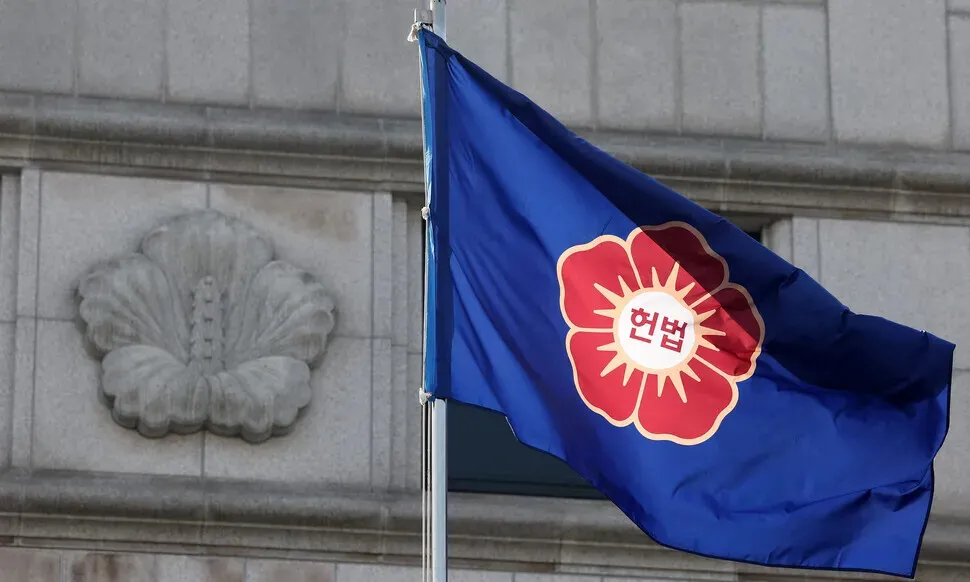hankyoreh
Links to other country sites 다른 나라 사이트 링크
[Column] What will happen if the court overturns Yoon’s impeachment


By Seong Han-yong, senior political writer
Ancient Athens had a system for banishing potential tyrants. If 6,000 people signed their name on shards of pottery, the individual in question would be banished from the city for 10 years. That system was known as ostracism, and is the origin of the term still in use today.
Countries today have a system for removing high-ranking public officials who engage in illegal or unconstitutional behavior of a serious nature. That system relies not on standard legal procedures, but on a special procedure known as impeachment.
Impeachment developed as a means for the legislature, the body representing the public, to hold senior officials in the government accountable for their behavior. Generally speaking, there are two kinds of impeachment systems. There’s a legalistic model in which the bill of impeachment is passed by the legislature and the final decision reached by a judicial body. There’s also a democratic model in which the legislature is responsible both for passing the bill of impeachment and for holding the impeachment trial.
The legalistic model has been adopted by Korea and Germany, and the democratic model by the US and the UK. In either case, the prerogative to pass a bill of impeachment belongs solely to the legislature, in its representative role.
Something that ostracism and impeachment have in common is that both are systems that enable the sovereign people to eject a high-ranking public servant. These systems are a kind of last-ditch measure for preserving democracy and the constitution. They’re completely different from the judicial processes used against ordinary criminals. Therefore, the will of the people is of paramount importance in impeachment.
On March 12, 2004, the Korean National Assembly passed a bill of impeachment against President Roh Moo-hyun with the support of 193 of 271 assembly members. The rationale for impeachment was that Roh had campaigned on behalf of the Uri Party in the parliamentary elections scheduled for April 15. The impeachment vote was orchestrated by the Grand National Party and the Millennium Democratic Party.
But the National Assembly’s bill of impeachment definitely failed to reflect the popular will. Polls at the time showed that impeachment was opposed by around 80% of the population. So Roh’s impeachment aroused a huge backlash right before the parliamentary elections.
Analysts thought the Grand National Party would be lucky to win 50 seats, and might win as few as two. Future president Park Geun-hye, who was then a lawmaker, rose to the occasion and helped the party win 121 seats, earning her the nickname of “election queen.”
The Uri Party claimed 152 seats in the election thanks to popular anger at the National Assembly’s rash decision to impeach Roh. Then on May 14, the Constitutional Court rejected Roh’s impeachment.
On Dec. 9, 2016, the National Assembly passed a bill of impeachment against President Park Geun-hye with 234 of 300 sitting lawmakers supporting the motion.
Park’s impeachment was the result of the influence-peddling scandal, involving Choi Soon-sil, that had come to light in September 2016. That bill of impeachment was sponsored by the Democratic Party, the People’s Party and the Justice Party. But a fair number of lawmakers from Park’s own Saenuri Party also voted to impeach her.
The Constitutional Court returned its verdict in Park’s impeachment trial on March 10, 2017. A Gallup poll in the third week of March, just before the verdict was announced, showed that 81% of people supported Park’s impeachment, with 14% opposed. Support for impeachment prevailed in every area and every age group. Only supporters of the Liberty Korea Party (the successor to Park’s Saenuri Party) were generally opposed to impeachment (14% in favor, 76% against).
The Constitutional Court’s decision to remove Park from office was unanimous. In effect, both the National Assembly and the Constitutional Court faithfully implemented the popular will.
On Dec. 14, 2024, the National Assembly passed a bill of impeachment against President Yoon Suk-yeol with 204 of 300 lawmakers voting for the bill. Lawmakers were responding to Yoon’s illegal declaration of martial law on Dec. 3. Twelve lawmakers with Yoon’s ruling People Power Party cast their votes in favor of the bill.
Polls by Gallup Korea in the first week of March, with the Constitutional Court’s verdict in the impeachment trial expected at any time, found that 60% of the public support Yoon’s impeachment, while 35% oppose it. That’s still a substantial gap, though it has narrowed from the 75%-21% ratio immediately after Yoon’s impeachment. (For more details, see the website of the National Election Survey Deliberation Commission.)
The only parts of the country where a majority oppose impeachment are Daegu and North Gyeongsang Province (32% in favor, 62% against). The only age group where opposition to impeachment prevails is those aged 70 and above (39% in favor, 53% against). Koreans in their 60s are split on the question.
Among supporters of the People Power Party, there’s overwhelming opposition to impeachment (10% in favor, 87% against), while impeachment is strongly favored by ideological moderates (71% in favor, 22% against).
Given public opinion, what would happen if the Constitutional Court were to remove Yoon from office?
Since a new president must be elected within 60 days, politics would quickly refocus on the presidential campaign. That’s exactly what happened after Park Geun-hye was removed from office in 2017. Far-right forces would object, but society would quickly stabilize.
What happens if the Constitutional Court overturns Yoon’s impeachment?
Such a step would be an overt rejection of the popular will. There would be unrest around the country.
Yoon would return to the presidency, but he wouldn’t be able to perform his duties as president. He would try to restore calm by shortening his presidency through a constitutional amendment, but Koreans wouldn’t accept that.
Korea would face economic pandemonium and a crisis in foreign policy and national security to boot.
The whole world would treat Korea as a political pariah. It would take decades to restore our national influence and status.
A constitutional amendment could someday eliminate the Constitutional Court. No constitutional body can endure if it fails to respect the popular will.
Please direct questions or comments to [english@hani.co.kr]

Editorial・opinion
![[Editorial] Asia Future Forum brings bright minds together to explore democracy’s future [Editorial] Asia Future Forum brings bright minds together to explore democracy’s future](https://flexible.img.hani.co.kr/flexible/normal/500/300/imgdb/original/2025/1024/1317612945603513.jpg) [Editorial] Asia Future Forum brings bright minds together to explore democracy’s future
[Editorial] Asia Future Forum brings bright minds together to explore democracy’s future![[Column] Russia and China’s golden ticket to destabilizing the dollar [Column] Russia and China’s golden ticket to destabilizing the dollar](https://flexible.img.hani.co.kr/flexible/normal/500/300/imgdb/original/2025/1023/2117612083961121.jpg) [Column] Russia and China’s golden ticket to destabilizing the dollar
[Column] Russia and China’s golden ticket to destabilizing the dollar- [Correspondent’s column] Martial law comes for the United States
- [Column] The end of the road for NewJeans, or a new beginning?
- [Editorial] Korea must prepare for rough road ahead with Japan
- [Editorial] Korea cannot afford to rush to a deal with the US
- [Column] Shared dilemmas at a historic turning point for Korea, Europe
- [Column] Halfway across the world, I’m cheering on Americans fighting for democracy
- [Column] How meritocracy turns into tyranny
- [Column] The real scandal of Korea’s ‘divorce of the century’
Most viewed articles
- 1Xi and Trump bring their battle to Gyeongju
- 2Korea allows same-sex couples to check ‘spouse’ box on census for first time
- 3[Column] Facing our fear of the “welfie” in “All of Us Are Dead”
- 4Cyberbullying and serial celebrity suicides
- 5Japan’s new PM orders revision of 3 key national security documents
- 6Korea’s response to martial law crisis a model of 3 strategies for defending democracy, says Levitsk
- 7Survey: after-school academies the biggest source of students’ stress
- 8Real-life heroes of “A Taxi Driver” pass away without having reunited
- 9S. Korean chaebols comprise 84% of GDP but only 10% of jobs
- 10German TV channel removes documentary on Korea for failure to meet journalistic standards